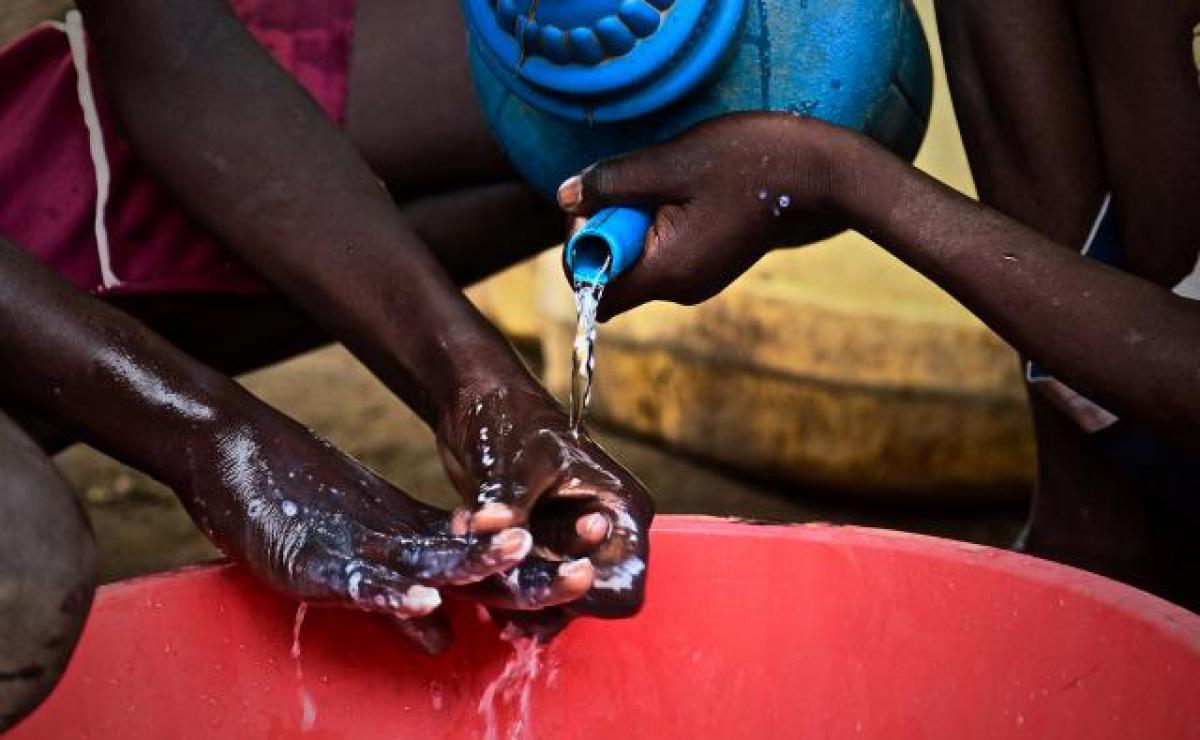COVID-19: Responding when social distancing isn’t an option

LWF World Service concerned about long-term effects of the pandemic
(LWI) - Unparalleled cooperation, resilience and commitment, but also an enormous challenge for field staff and the communities we serve – this is what a global health emergency has meant for humanitarian and development work. Half a year after the Coronavirus Disease (COVID-19) was declared a pandemic, staff of the Lutheran World Federation’s (LWF) humanitarian and development arm World Service are proud of how the emergency was handled, but also concerned for the years to come.
“There was a high level of collaboration and understanding between the UN agencies, partner organizations, and our donors,” says Chey Mattner, LWF World Service Head of Operations. “This very pragmatic and flexible approach allowed us to adapt our programs and to quickly respond to the new situation.”
Priority: Clean water
LWF World Service works with refugees, their hosts and vulnerable communities in 25 countries in Africa, Asia, Latin America and the Middle East . The LWF water and sanitation programs have further expanded since the outbreak. “We needed to prioritize the provision of clean water”, Mattner says. LWF staff also conducted awareness-raising campaigns about the dangers of COVID-19 and proper hygiene.
“In the refugee camps where we work, physical distancing is not an option,” Mattner says. “We therefore had to make sure people got the right information, in their own language.” This proved to be especially important in the Rohingya IDP camps in Myanmar, but also in the large refugee settlements in Kenya and Uganda. LWF also provided additional information to Palestinians in East Jerusalem and the occupied territories.
Learning through radio lessons
In the refugee camps, where LWF is running schools, learning conditions also needed to be adapted. In Kenya, South Sudan and Myanmar, schools have been closed since March. While in some regions, students in regular schools could benefit from learning programs online or on the radio, this was not available to many refugee children, who did not have the technical equipment to access those services, nor the necessary radio connection in the remote camps.
Protection officers and teachers are also very concerned about the impact this situation has on the children, especially girls. “We see an increase in teen pregnancies, early marriages, and domestic violence,” says Lokiru Yohana, LWF Regional Program Coordinator and Child Protection Focal Point. Without the protection mechanisms embedded in schools, including simply wearing school uniforms, he fears many children will be defenseless against violence and abuse, and that many may drop out of school altogether.
Community-based approach
Many of the protection concerns are directly linked with the loss of livelihoods. Because of lockdowns and other restrictions, several families have lost their income. LWF in Jordan and South Sudan has seen families resort to so-called negative coping mechanisms, the most popular being to fast-track child marriages, as the girl’s family then receives a dowry.
LWF staff have increased cash-based interventions and cash-for-work projects, to support communities in this time of need. In Iraq, LWF has been distributing food parcels. “In this situation, we very much benefit from our rights-based community-empowerment approach”, says Allan Calma, LWF Global Humanitarian Coordinator. “In these times, when movement is restricted, it is good that we can continue working through the community organizations which we helped establish as well as through refugee incentive staff workers which make up the majority of our global staff numbers. These mechanisms helped us ensure that critical support to those we seek to assist continues even during strict movement restrictions due to COVID-19.”
While the many local incentive workers enable LWF to stay with the people, they are also most at risk, Calma says. “They are able to move freely, but this increases their risks of exposure.” He is worried that unless they receive additional support, community groups and other systems of self-organization might weaken over time, making it more difficult to reach people in need.
Stress amongst staff during uncertain times
LWF security adviser Susan Muis is concerned about the additional stress COVID-19 causes the 9,000 LWF field staff. “Not knowing how long the situation will last increases the stress,” she says. “We are worried about the impact on national and international staff. At the moment the date for returning to normal program implementation is not known. In these uncertain situations, some staff intends to work very long hours, which is understandable as they see how the needs are often beyond their capacity to help.”
In many project areas, the pandemic is exacerbating already challenging operational environments: locusts, flooding, earthquakes, armed conflicts have brought additional challenges for strengthening resilience of the population. Humanitarian access is difficult because of movement restrictions and additional access requirements asked. There have been accusations that aid workers in some regions did bring the virus to communities. “This really is a concoction of disasters which will stay with us for a long time,“ Mattner said.
LWF/C.Kästner
LWF World Service is calling for donations, to meet the additional needs caused by the COVID-19 pandemic. Please support our work with the people who need it most.
Coronavirus and humanitarian aid: In a series of articles, LWF will show how the pandemic has impacted its humanitarian and development work worldwide, and what it means for the communities we serve.

